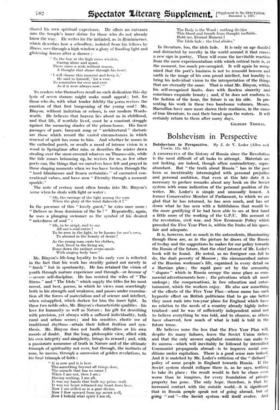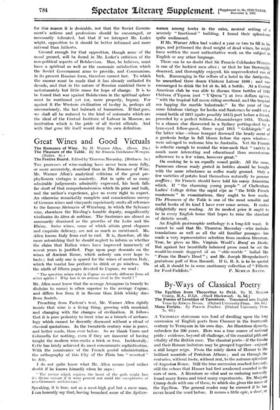Bolshevism in Perspective
Bolshevism in Perspective. By J. de V. Leder (Allen and Unwin. 12s. 6d.) A CONSPECTUS of the history of Russia since the Revolution is the most difficult of all tasks to attempt. Materials are not lacking, are indeed, though often contradictory, supre- abundant. But " the truth about Russia " has in the past been . so inextricably intermingled with personal prejudice and personal ambition, that even at .this late date it is necessary to preface remarks about any book on the Soviet system with some indication of the personal position of the writer. Mr. Loder's is simple and unusually honest. A former Conservative Member of Parliament, to which we are glad that he has returned, he has seen much, and has set down what he has seen with a faithfulness that would be the more gratifying if lie had been able to see at first hand a little more of the working of the G.P.U. His account of the revolution, civil war, and New Economic Policy which preceded the Five Year Plan is, within the limits of his space, fair and adequate.
It is, however, not so much in the antecedents, illuminating though these are, as in the picture he draws of the Russia of to-day and the suggestions he makes for our policy towards the Russia of the future, that the chief interest of Mr. Loder's book will be found. He noted, as no foreigner can fail to do, the drab poverty of Moscow ; the circumscribed nature of the Russian workman's life, organized in every detail on a Marxian plan ; the rapid pace set by the screaming " slogans " which in Russia occupy the same place as com- mercial advertisements here ; the privations which all must undergo ; the compensations, in free education and enter- tainment, which the workers enjoy. He also saw something of the effects of the Five Year Plan—whose name has such hypnotic effect on British politicians that to go one better they must rush into ten-year plans for England which have no relation to the needs of a country already highly indus- trialized—and he was of sufficiently independent mind not to believe everything he was told, and to observe, as others have observed, how much of what is told is told in the future tense.
He believes none the less that the Five Year Plan will, despite its many failures, leave the Soviet Union richer, and that the only answer capitalist countries can make to its success—which will inevitably be followed by intensified Communist propaganda abroad—is to improve social con- ditions under capitalism. There is a good. sense rare indeed. And it is matched by .Mr. Loder's criticism of the " diehard " policy of some people in England towards Russia. • If the Soviet system should collapse there is, as he says, nothing to take its place : the result would in fact be chaos even worse than he imagines, for every foundation of private property ,has gone. The only hope, therefore, is .that by increased contact with the outside world—it is significant that in Russia people speak not of going abroad, but of going -..out "—the Soviet -system–will itself evolve. And
for this reason it is desirable, not that the Soviet Govern- ment's actions and professions should be encouraged, or necessarily tolerated, but that if we interpret Mr. Loder aright, opposition to it should be better informed and more rational than hitherto.
Ground enough for that opposition, though none of the usual ground, will be found in Mr. Loder's criticism of the non-political aspects of Bolshevism. Man, he believes, must have a spiritual as well as the economic satisfaction which the Soviet Government aims to provide, and Communism, in its present Russian form, therefore cannot last. To which the answer must be made that it has already outlasted its decade, and that in the nature of Russian mankind there is unfortunately but little cause for hope of change. It is to be feared that war against Bolshevism in the spiritual sphere must be continued yet (or, more properly, begun). For against it the Western civilization of to-day is, perhaps all unconsciously, the last bulwark of humanism. If that goes, we shaft all be reduced to the kind of automata which are the ideal of the Central Institute of Labour in Moscow, an institution which is the pride of all Soviet officials. And with that gone life itself would deny its own definition.











































 Previous page
Previous page